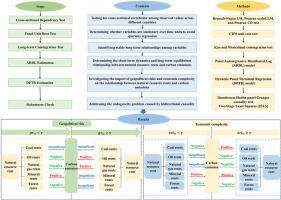重新研究自然资源租金对碳排放的影响:地缘政治风险和经济复杂性的新见解
IF 10.2
2区 经济学
0 ENVIRONMENTAL STUDIES
引用次数: 0
摘要
了解自然资源租金与碳排放之间的关系对于实现经济发展与环境可持续性之间的平衡至关重要。本研究重新研究了自然资源租金对碳排放的影响,并探讨了地缘政治风险和经济复杂性的门槛效应,旨在更全面地理解二者之间的关系。基于 1995 年至 2021 年 38 个国家面板数据的实证分析,得出以下结论。(i) 面板 ARDL 估计结果显示,自然资源租金会长期增加碳排放,在解决了内生性问题后,这一结论依然稳健。(ii) DPTR 模型结果表明,自然资源租金对碳排放具有非线性影响,受地缘政治风险和经济复杂性的影响。随着地缘政治风险的升级,资源租金对碳排放的影响由减少转为增加。相反,经济复杂性的上升会逆转这种影响,使自然资源租金减少碳排放。(iii) 异质性分析结果表明,只有石油和天然气租金对碳排放的影响受到高地缘政治风险的影响。此外,在经济高度复杂的情况下,石油、天然气和森林租金有助于减少碳排放,而煤炭和矿产租金则会产生负面影响。最后,结合地缘政治风险和经济复杂性,提出了对全球资源管理和环境可持续性的政策影响。本文章由计算机程序翻译,如有差异,请以英文原文为准。

Reinvestigating the impact of natural resource rents on carbon emissions: Novel insights from geopolitical risks and economic complexity
Understanding the relationship between natural resource rents and carbon emissions is crucial for achieving a balance between economic development and environmental sustainability. This study reinvestigates the impact of natural resource rents on carbon emissions and explores the threshold effects of geopolitical risks and economic complexity, aiming to provide a more comprehensive understanding of their relationship. Based on an empirical analysis of panel data from 38 countries between 1995 and 2021, the conclusions are as follows. (i) The panel ARDL estimation results reveal that natural resource rents increase carbon emissions over the long term, with this finding remaining robust after addressing endogeneity. (ii) The DPTR model results indicate that natural resource rents have a non-linear impact on carbon emissions, shaped by geopolitical risks and economic complexity. As geopolitical risks escalate, the effect of resource rents on carbon emissions shifts from a reduction to an increase. On the contrary, rising economic complexity reverses this impact, causing natural resource rents to reduce carbon emissions. (iii) Heterogeneity analysis results demonstrate that only the impact of oil and natural gas rents on carbon emissions is affected by high geopolitical risks. Additionally, in contexts of high economic complexity, oil, natural gas, and forest rents help reduce carbon emissions, while coal and mineral rents have a negative impact. Finally, policy implications for global resource management and environmental sustainability that combine geopolitical risk and economic complexity are proposed.
求助全文
通过发布文献求助,成功后即可免费获取论文全文。
去求助
来源期刊

Resources Policy
ENVIRONMENTAL STUDIES-
CiteScore
13.40
自引率
23.50%
发文量
602
审稿时长
69 days
期刊介绍:
Resources Policy is an international journal focused on the economics and policy aspects of mineral and fossil fuel extraction, production, and utilization. It targets individuals in academia, government, and industry. The journal seeks original research submissions analyzing public policy, economics, social science, geography, and finance in the fields of mining, non-fuel minerals, energy minerals, fossil fuels, and metals. Mineral economics topics covered include mineral market analysis, price analysis, project evaluation, mining and sustainable development, mineral resource rents, resource curse, mineral wealth and corruption, mineral taxation and regulation, strategic minerals and their supply, and the impact of mineral development on local communities and indigenous populations. The journal specifically excludes papers with agriculture, forestry, or fisheries as their primary focus.
 求助内容:
求助内容: 应助结果提醒方式:
应助结果提醒方式:


